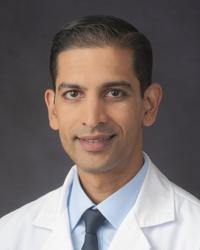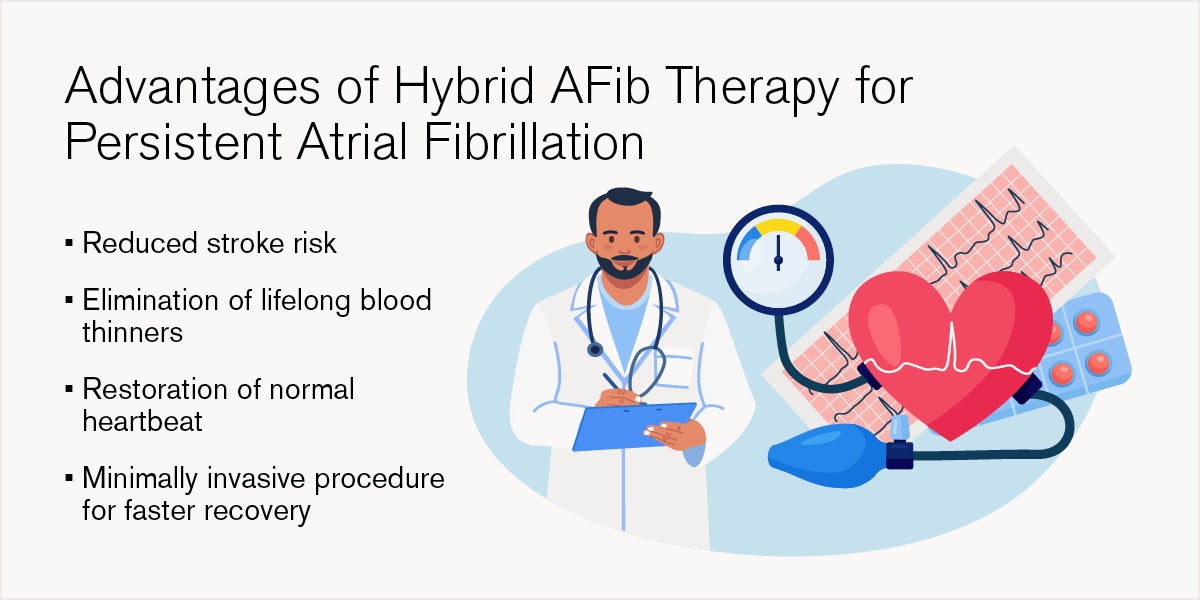Hybrid AFib Therapy: A Breakthrough Treatment for Persistent Atrial Fibrillation
June 2, 2025
Categories: Cardiology
Tags: Atrial Fibrillation, AFib

By: Smit Vasaiwala, MD, Cardiology
Approximately 1 in 4 adults over age 40 will develop atrial fibrillation, or AFib, during their lifetime. AFib is an irregular heartbeat that can seriously impact your health. Symptoms can include fatigue, shortness of breath, dizziness, chest pain, and even an increased risk of stroke.
Fortunately, treatment options are expanding, and, in addition to conventional treatments, such as a catheter ablation and certain medications, Loyola Medicine is excited to offer hybrid surgical-catheter ablation, a cutting-edge, two-step procedure specifically designed for patients with advanced AFib. Known as hybrid atrial fibrillation therapy, this innovative approach combines the expertise of cardiac surgeons and electrophysiologists to provide relief to patients who have persistent or long-standing persistent AFib.
“Hybrid ablation is a team-based approach that combines the expertise of cardiac surgeons and electrophysiologists. We target the abnormal heart rhythm from both inside and outside the heart," says Smit Vasaiwala, MD, a cardiologist at Loyola Medicine.
What is hybrid atrial fibrillation therapy?
Hybrid atrial fibrillation therapy is a specialized treatment designed to target and stop the erratic electrical signals that cause AFib. It combines two distinct procedures: epicardial ablation, performed by a cardiac surgeon, and endocardial ablation, performed by an electrophysiologist. By working together, these procedures provide a comprehensive treatment to restore your heart’s rhythm.
“By closing the left atrial appendage with a surgical clip, we not only reduce stroke risk, but we also electrically isolate a major source of AFib in many patients," says Dr. Vasaiwala.
How hybrid atrial fibrillation therapy works
The hybrid atrial fibrillation therapy involves two separate but coordinated procedures:
Step 1 - Epicardial Ablation
This procedure is performed by a cardiac surgeon who makes a small, 2 to 3 cm incision just below your breastbone. The surgeon carefully creates overlapping lesions on the back (posterior) wall of your heart. These lesions form barriers that block the abnormal electrical signals causing AFib. This step also includes closing off the left atrial appendage, an area where blood clots commonly form, using a special atrial clip. This helps reduce the risk of stroke and may allow patients to stop using blood thinners long-term.
Step 2: Endocardial Ablation
Several weeks after the epicardial ablation, an electrophysiologist completes the treatment. Using a catheter inserted through a vein in your leg (femoral vein), the doctor maps out any remaining abnormal electrical signals inside your heart. Additional lesions are then made at the pulmonary veins and other trouble areas. This comprehensive approach ensures a higher chance of successfully restoring your heart’s normal rhythm.
Who is a good candidate hybrid surgical-catheter ablation?
Hybrid surgical-catheter ablation is best suited for patients who have persistent or long-standing persistent AFib lasting more than 12 months. It is especially beneficial if you've tried other treatments without success or if you're unable to tolerate certain medications. Candidates typically experience frequent or continuous symptoms and may face challenges using blood-thinning medications long-term.
Benefits of hybrid atrial fibrillation therapy
Hybrid atrial fibrillation therapy offers several significant advantages including reduced risk of stroke, elimination of blood thinners, restoration of a normal heartbeat, and smaller incisions for a quicker recovery compared to traditional surgery.

“Our experience at Loyola has shown a high success rate in restoring normal rhythm with this approach. It’s been incredibly promising for patients who have struggled with advanced AFib," says Dr. Vasaiwala.
Recovery after hybrid atrial fibrillation therapy
Recovery from hybrid atrial fibrillation therapy is generally quick and manageable:
- You will typically spend 2–3 days in the hospital after the epicardial ablation.
- Pain management is well-controlled, and most patients experience minimal discomfort.
- After endocardial ablation, patients often go home the same day with minimal to no pain.
- You will resume heart medications as prescribed by your healthcare team.
- Your doctors will guide you on when to safely return to your regular daily activities.
Loyola Medicine’s unique approach treating persistent AFib
At Loyola Medicine, we go beyond standard care to ensure the highest quality outcomes for patients experiencing AFib. Our specialists utilize advanced mapping techniques, including artificial intelligence mapping, during the endocardial ablation. This innovative approach identifies and targets specific areas that traditional methods might miss, greatly increasing the effectiveness of the treatment.
Cardiothoracic surgeon Chirantan Mangukia, MD, also uses detailed voltage mapping during the surgical portion of the procedure to ensure the ablation is thorough and precise. Loyola Medicine is currently one of very few institutions offering this comprehensive and technologically advanced combination of hybrid therapy and AI mapping, making us unique in the Chicago area.
“Dr. Mangukia goes beyond the standard procedure. He performs mapping during the surgical ablation to confirm the quality of the lesions. That level of precision really sets us apart," says Dr. Vasaiwala.
If you or a loved one is living with advanced AFib, consider speaking with the specialists at Loyola Medicine about hybrid surgical-catheter ablation. Together, we can help you find a lasting solution and get back to enjoying life with a healthy, normal heartbeat.
Smit Vasaiwala, MD, is a cardiologist at Loyola Medicine. His clinical interests include ablation catheter application for complex arrhythmias, ablation of atrial fibrillation, ablation of ventricular tachycardia, ablations for arrhythmias, arrhythmias, biventricular pacing, defibrillator devices, electrophysiology, hypertrophic cardiomyopathy, radiofrequency ablation of cardiac arrhythmias and ventricular tachycardia.
Dr. Vasaiwala earned his medical degree at Loyola University Chicago's Stritch School of Medicine. He completed a residency in general internal medicine at University of Michigan Medical Center and two fellowships in cardiology and electrophysiology at Loyola University Medical Center.
Book an appointment today to see Dr. Vasaiwala or another Loyola specialist by self-scheduling an in-person or virtual appointment using myLoyola.
